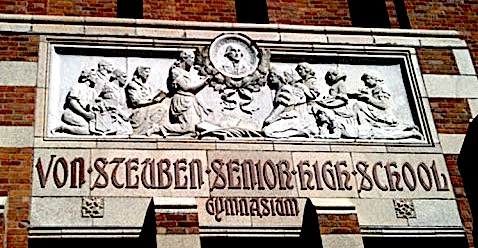Going to School with the Baron
To the Editor:
The article on Baron Von Steuben (Nov.-Dec. 2020) was a useful reminder that even such hallowed historic episodes as the American Revolution have their erotic motors. Although Von Steuben’s sentimental attachments were known to German sexologists of the early 20th century, they apparently were not known to American educators.
 In the late 1950s, I attended Von Steuben Senior High School in the North Park area of Chicago. (We pronounced it, not “fon Shtoiben,” but “von Stoob’n” or “dear old Von” for short.) Erected in 1930, it was graced with two bas-reliefs over the main doors. One was an allegory of education linking male and female. The other, appropriately above the doors to the gym, showed Von Steuben in a bewreathed rondel, flanked by mainly male acolytes, kneeling in admiration. In my day the school enjoyed a high scholastic average. Today it is the Von Steuben Metropolitan Science Center, still garnering honors. I don’t know if the student body has an LGBT group, but, if so, it should rejoice in the name.
In the late 1950s, I attended Von Steuben Senior High School in the North Park area of Chicago. (We pronounced it, not “fon Shtoiben,” but “von Stoob’n” or “dear old Von” for short.) Erected in 1930, it was graced with two bas-reliefs over the main doors. One was an allegory of education linking male and female. The other, appropriately above the doors to the gym, showed Von Steuben in a bewreathed rondel, flanked by mainly male acolytes, kneeling in admiration. In my day the school enjoyed a high scholastic average. Today it is the Von Steuben Metropolitan Science Center, still garnering honors. I don’t know if the student body has an LGBT group, but, if so, it should rejoice in the name.
Laurence Senelick, Medford, MA
The Gay Archetype Goes Deeper Still
To the Editor:
What a tease to see Brian Gleason’s “Why ‘Gay’ Still Matters” in the November-December 2020 issue. After the annus horribilis of 2020, my heart leapt to see contemporary discussions of “gay soul,” gay Self, and homosexual essentialism. But I was surprised at what was missing from Dr. Gleason’s essay: any whiff of the Jungian shadow, how gay myth informs the shadow’s exploration, and why that gay exploration matters to the world now.
In an issue dedicated to mythology, I yearned for a mention of Gilgamesh and Enkidu, the Sumerian gay soap opera and original gay myth from nearly two millennia before Plato, and more than four thousand years before this issue of the GLR. Gilgamesh can be read as a mythological guide for homosexual Self-exploration and Self-becoming, as well as a story built for Netflix bingeing: a handsome, dissolute king falls deeply in love with the manly, earthly Enkidu; the two have wild adventures and fight monsters and, when Enkidu dies, Gilgamesh delves into the underworld to find him. Pretty sexy, right?
When Gleason invoked Harry Hay, I imagined he was leading to Mitch Walker, a Jungian psychoanalyst and scholarly activist who helped Hay found the Radical Faeries. Walker explored Gilgamesh, Jung, and the homosexual archetypal myth in his seminal 1976 article “The Double,” in which he proposed a gay-centered archetype to balance the contra-sexual duality with which we are inculcated.
Which gets to why gay actually matters—in the hero myth of our time, neither the dragon of systematic and culturally sanctioned racism, nor the hydra of mass extinction and climate collapse, can be defeated with today’s heterosexist and macho myths of suppression and vanquishing. In materialist, capitalist, early-21st century America, we live steeped in myths of eternal, irreconcilable conflict: male-female, Republican or Democrat, black or white, all or nothing, mine or yours. These binary myths have produced the modern world—technologically advanced, but spiritually barren and environmentally endangered. The heterosexual answer has been to double-down on its old, desiccated myths of paranoid conspiracy theories and strongmen leaders.
In such a world, gay matters because our exploration of the psychological shadow holds the keys to a new, transformative myth that bridges the hetero opposites, uniting and unifying rather than dividing and conquering. Just as Gilgamesh went into the underworld motivated by his gay love for Enkidu, we have the potential to delve into our own individual underworlds to encounter and integrate our own unconscious material, a hard-won and long-overdue skill that can remake the world. In working with my own shadow, I’ve strived to account for the literalism and meaninglessness of my own consumerist and capitalist upbringing, and the competitiveness that comes from proving oneself while growing up in an emotional warzone. Such work can strengthen the bonds of relationships, temper the disposable materialism that plagues our era, and provide much needed meaning in the age of Instagram and Twitter.
Never one to tease, Walker invokes the true length and girth of our gay potential in Visionary Love: A Spirit Book of Gay Mythology and Transmutational Faerie (1980): “Let us build fairy mythologies—gay ways of thinking and doing—to realize and protect our loving soulful brotherhood, to reclaim our Selves, re-create our culture, regain our heritage, re-member our fates as beings of Spirit, wisdom, power, compassion, truthfulness, light.”
Is there any greater goal in these days; any greater gay myth to which we can strive?
Jason Oclaray, Los Angeles
A Case of “Who Was First?”
To the Editor:
In Martha E. Stone’s review of W. Jason Miller’s biography of Langston Hughes (Nov.-Dec. 2020), she states that the book “seems to have been rushed into production, with numerous misspellings and at least one glaring error.” She then goes on to identify that error as Miller’s assertion that Hughes was the first African-American to have a script published by a Hollywood studio.
From reading this review, I think that Miller may have made another statement that, if not an error, may be a little misleading. The review states that “Hughes was the first African-American writer to make a living exclusively from his writing.” While perhaps a fine point, I believe that Paul Laurence Dunbar actually made a living solely from his writing at various points in his career, the most notable being the time period from 1898 until his death. Although Dunbar did have a job at the Library of Congress, he left that job and devoted the remainder of his life to his writing. This is only relevant in the sense that while we rightly honor the achievements of Hughes, Dunbar’s significant contributions are often overlooked.
Randy Fair, Wilton Manors, FL
Writer’s Take on Free Speech Challenged
To the Editor:
I was rather disappointed in Andrew Holleran’s piece “Books from a More Honest Time” [Sept.-Oct. 2020 issue]. Even the headline reads like a version of “Make America Great Again”—nostalgia for a prelapsarian age when white people’s language around race wasn’t challenged. Safely sequestered in his home, he reads a bunch of books by… white people, apparently, because that’s all he has on his shelf. He seems to have no curiosity about what Black writers (or trans writers, for that matter) might have to say, and how their books might inform his own thinking.
He compares current anti-racist struggles to the witch hunts of McCarthyism, when people’s careers and lives were destroyed by the state, and entire movements for social justice were smashed! Holleran makes the privileged person into the victim. So what does he consider the proper way of fighting for dignity? He says “gay people spoke out; they wrote, they shouted, they demanded to be heard. Gay liberation was based on freedom of speech.” What would he say to the person who smashed the pie in Anita Bryant’s face? That they were no better than Trump? That Bryant should have been allowed to speak? Racism existed before Trump and will exist when he is gone. Oppressed people have a right to challenge the status quo as they see fit. As they do, society’s consciousness changes, language changes, and so must writing. Language does matter quite a lot, and it’s a shame that a great writer like Holleran doesn’t seem to understand that.
Gordon Beeferman, New York, NY
Mistral’s Poetry Is Available in English
To the Editor:
I greatly enjoyed J. B. Polk’s essay on the great Chilean poet Gabriela Mistral [Nov.-Dec. 2020 issue]. I’m glad her life and loves are becoming better known. Polk noted that few of Mistral’s poems have been translated, which may give the impression that her work is hard to find in English.
It is true that there’s no “complete poems” of Mistral in English, but at least five partial collections exist, including a selection of over seventy translated by gay poet Langston Hughes, published by the Univ. of Indiana Press in 1957 and reissued in 1961. Doris Dana’s own bilingual selection of about the same number appeared from Johns Hopkins Univ. Press in 1971. These are out of print but can be found used. Ursula K. Le Guin published the largest selection, 164 poems, issued by the Univ. of New Mexico Press in 2003. This is a bilingual edition, as is Dana’s.
In addition, there are two smaller but interesting selections. One is in English only (as is the Hughes), by Maria Giachetti and Marjorie Agosin, and is titled A Gabriela Mistral Reader (1993). It also includes some prose works. It’s a good introduction to Mistral. Finally, there is an illustrated bilingual large-format book titled The Mothers’ Poems (1996), by Eastern Washington University Press. This translation is by Christiane J. Kyle, illustrations by Sara Adlerstein González.
Mistral is always a worthwhile read. I hope that those interested in her work find and enjoy one of these collections.
Alan Contreras, Eugene, OR
Two Men of Bloomsbury Confused
To the Editor:
I was pleased to see the Felice Picano review of the Gillian Gill book on Virginia Woolf in your current issue [Nov.-Dec. 2020], a book which I read and loved—a revelatory book even for those who thought they already knew everything there was to know about Woolf and Bloomsbury.
However, Picano makes a significant error in his recounting of the Duncan Grant–Vanessa Bell pairing and their child, Angelica Bell. In botching the facts, he misses the whole point of the scandal that resonates today: David ”Bunny” Garnett shared the house with Vanessa Bell and Duncan Grant, and he was Duncan’s lover. Duncan was also involved with Vanessa. John Lehmann was not ”Bunny,” as Picano states, but was a man of letters and a member of the Bloomsbury set.
Garnett said when first viewing baby Angelica that he would one day marry her, and that he did. Angelica never learned before the marriage that Duncan, her father, and Bunny Garnett, her husband, had been lovers. Vanessa kept it under wraps. Angelica said she never would have married him had she known.
Robert Brokl, Oakland, CA



